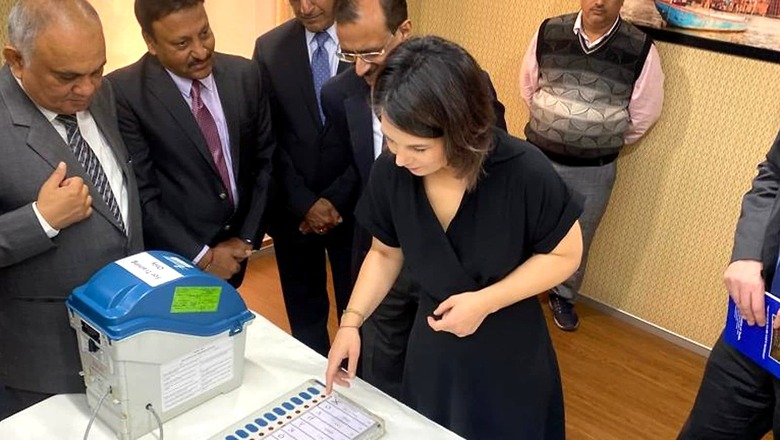
views
German foreign minister Annalena Baerbock on Tuesday met Chief Election Commissioner Rajeev Kumar in New Delhi where the latter gave a demonstration on how the Electronic Voting Machine (EVM) works.
“The minister was briefed about the extensive use of technology by ECI in the conduct of elections broadly under three verticals of voters’ participation, political parties/candidates and election machinery logistics. She personally cast a vote through EVM during a demonstration of EVM-VVPAT functioning organised by ECI for the delegation,” the Election Commission (EC) said in a press release.
Pictures released by the ECI showed Baerbock casting a vote as officials from the EC guided her through the process.
In its press release, ECI said both India and Germany are members of the International Institute of Democracy and Electoral Assistance (IDEA), Stockholm and the Community of Democracies and its continues to bat for closer cooperation among electoral authorities abroad, while strengthening democratic institutions and processes.
Does Germany Use EVMs?
According to Washington’s National Democratic Institute (NDI), Germany used EVMs on a trial period for several elections spanning from 1998 to 2005. EVMs made their debut during elections in the city of Cologne in 1998.
After a successful trial, EVMs were used in Cologne’s European Parliament elections.
These machines were developed and manufactured by Dutch company NEDAP and 2 million people in Germany used these machines to cast their votes, including during the 2005 general elections.
Soon after the 2005 general election, two citizens challenged the usage of EVMs before the German Constitutional Court and said these were unconstitutional and prone to being hacked.
According to the NDI, the court upheld the first argument and said the usage of machines supplied by Dutch company NEDAP was unconstitutional and elections are required to be public in nature, according to the constitution.
The court, however, did not rule out using EVMs but said: “The legislature is not prevented from using electronic voting machines in elections if the possibility of a reliable examination of correctness, which is constitutionally prescribed, is safeguarded.”
This ended Germany experimentation with EVMs and after the Court’s ruling no further moves were made to adopt machines that meet the transparency requirements.
Baerbock Visits Chandni Chowk, Gurdwara
Baerbock is in India for a diplomatic visit and has held meetings with Union external affairs minister S Jaishankar. On Monday after her meeting with Jaishankar, both ministers signed the agreement on Comprehensive Migration and Mobility Partnership.
The agreement facilitates mobility and employment opportunities for fostering the exchange of skills and talents. “The Agreement has specific provisions to facilitate mobility and employment opportunities for fostering exchange of skills and talents. These include the Academic Evaluation Center in New Delhi, eighteen months extended residence permits to students, three thousand Job Seeker Visas annually, liberalised short stay multiple entry visas and streamlined readmission procedures,” the external affairs ministry said in a press release.
Baerbock also visited the historic Chandni Chowk market, made payments using the United Payments Interface (UPI) at a nearby market, visited the Sis Ganj Sahib gurdwara where she prepared langar for devotees and took a metro ride to the Red Fort.
(with inputs from Shalinder Wangu)
Read all the Latest News here




















Comments
0 comment